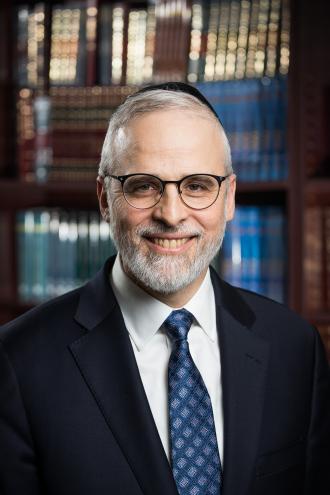In this week's parsha, we find the second paragraph of keriyas shema. Once again, (11:18) the mitzvos of tefillin and mezuzah are mentioned. Rashi, on the words "vesamtem es devarai eileh," makes a rather startling comment. "Even after you are exiled, still be excellent in mitzvos. Put on tefillin and make mezuzos so that they are not new to you when you return to Eretz Yisroel." The implication is that tefillin and mezuzah are mitzvos that are not biblical obligations outside of Eretz Yisrael but are only performed so as not to be forgotten. However, the gemara (Kiddushin 36b) clearly states that all mitzvos that are not based on the land are practiced both in Eretz Yisrael and outside.
The GR"A raises this question and gives an answer in the name of Masa'as Moshe. He posits that the words in Rashi "hanichu tefillin va'asu mezuzos" are a mistake. The original text of Rashi had an abbreviation "heh-tuv, v'ayin-mem" which really stood for "hafrishu terumah v'isru ma'aser." Terumah and ma'aser are mitzvos which are land-based and apply only in Eretz Yisrael but were practiced while B'nei Yisrael were in exile as well, in order that they not be forgotten. Somewhere along the line, a printer made the error of thinking that Rashi's abbreviation stood for "hanichu tefillin vasu mezuzos." (I'm not sure what the relevance would be to this pasuk, based on this approach.)
Ramba"n, however, suggests that this midrash is actually hinting to a deep secret which he has previously referred to (Vayikra 18:25.) Gur Aryeh here explains based on Ramba"n's commentary in parshas Toledos on why the forefathers kept the mitzvos only in Eretz Yisrael, that the actual reason why the Torah commanded us to keep the mitzvos outside of Eretz Yisroel as the gemara teaches us, is because of the reason Rashi gives here. In other words, it is true that we have a full-fledged requirement to keep all of the mitzvos even outside of Eretz Yisrael. However, the ultimate reasoning behind it is to ensure that when we return to the Land where these mitzvos were meant to be performed, they are not forgotten. (I suggest, for a clearer understanding of the issue, going through the actual texts of the Gur Aryeh and the aforementioned Ramba"ns.)















